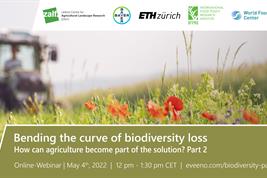13.04.2022

Agricultural transformation – what do farmers and researchers tell us? On 4th May 2022, the second webinar of the Bayer-funded project "Enhancing Biodiversity and Resilience in Crop Production" will take place and focusses on the collaboration among researchers, farmers and businesses. The webinar is co-hosted by ZALF.
A first part of a webinar series as part of a Bayer-funded project titled Enhancing Biodiversity and Resilience in Crop Production took place on 28 June 2021 and was hosted jointly by ETH Zurich and IFPRI. A panel of experts from different sectors discussed a range of topics including farmers’ constraints; the need for better-tailored policies; the role of the private sector; the necessity to change the valuation matrix of agricultural systems; the definition of biodiversity itself and new forms of agricultural landscapes managements through new alliances. This first webinar emphasized that a transition to sustainable agriculture needs to encompass a reformed policy framework that places environmental sustainability and healthy food production at the heart of support schemes. Effective collaboration among farmers, businesses and researchers is also needed to develop practices that build positive environmental values and outcomes.
This second webinar is now going to focus on one key aspect already raised in the first one: It is imperative in business to work alongside farmers to build sustainable agricultural systems that open new opportunities for farmers to draw on their historical and current creativity in agricultural practice. Understanding and working within farmer constraints to identify pathways towards biodiversity is the only way by which realistic solutions can be implemented.
The first results of interviews with French and German farmers will be presented, regarding their perceptions and experiences in relation to biodiversity-friendly practices and habitat creation solutions, their views on farm management priorities and issues, their aspirations and innovative management strategies considering changing environmental and regulatory conditions.
In parallel, the webinar will provide a scientific perspective: a review of scientific literature on habitat creation measures and their relationship to different biodiversity dimensions and how the behavioral sciences have identified barriers to the adoption of biodiversity-friendly practices and its utilization as an evaluation tool to implement new policy measures.
A panel consisting of farmers, agricultural and environmental scientists as well as representatives from industry will discuss the presented first results and questions during the event.
4 May 2022, 12pm- 1:30pm CET
Registration:
https://eveeno.com/biodiversity-panel
Program:
Presentation:
Results of the Bayer-funded research project „Enhancing Biodiversity & Resilience in Crop Production“ - ETH Zürich, World Food System Center (WFSC), Bayer, International Food Policy Research Institute (IFPRI)
Panel Discussion:
- Stefan Bernickel – Farmer from Germany
- Dr. Jesus Barreiro-Hurle - Joint Research Center of the European Commisson
- Prof. Frank Ewert - Leibniz Center for Agricultural Landscape Research (ZALF)
- Christoph Felgentreu - Interessengemeinschaft gesunder Boden e.V.
- Dr. Anja Gladbach - Bayer Crop Science
- Dr. Fatima Lehnhardt – Leibniz Center for Agricultural Landscape Research (ZALF)
- Maryam Yousefi - ETH Zürich
Moderator:
- Dr. Peter Zander - Leibniz Center for Agricultural Landscape Research (ZALF)
Hosted by:
- Leibniz Center for Agricultural Landscape Research (ZALF)
- Bayer
- ETH Zürich
- World Food System Center (WFSC)
- International Food Policy Research Institute (IFPRI)
